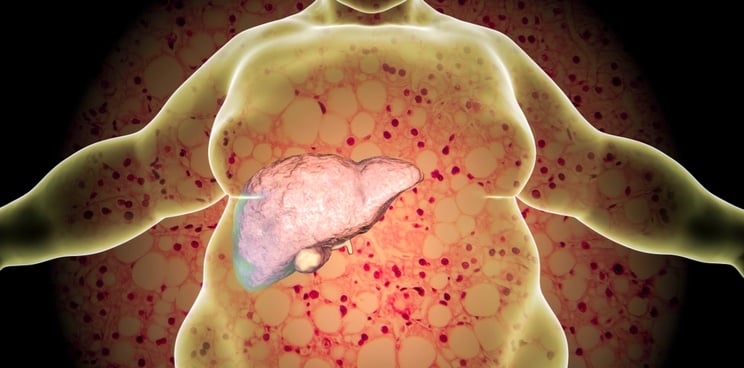Newsletter Signup - Under Article / In Page
"*" indicates required fields
Patients with the chronic liver disease NASH must now wait even longer for an approved treatment, after French biotech Genfit’s phase III trial of its lead drug candidate elafibranor failed. But, newer players, such as Novo Nordisk, are edging closer to the market.
This year, it is predicted that NASH — the full name of which is non-alcoholic steatohepatitis — will become the primary reason for liver transplantation. It is the most common liver disease worldwide and it’s predicted that up to 25% of Europeans have the condition.
However, despite much investment and many clinical trials of candidate drugs to treat NASH, there is still no approved treatment on the market for this often silent disease.
Commenting on the trial readout, Genfit COO, Dean Hum, said: “Although the response rates observed with elafibranor treatment were broadly aligned with our initial expectations, the placebo response rate was significantly higher than we anticipated.”
Although the results of the trial mean that approval for NASH is definitely not on the near horizon, Genfit is not giving up on elafibranor just yet. “We obviously intend to explore the whole dataset and deep dive into subpopulations. It’s too early to conclude anything at this stage, but more will come,” he told me.
In the face of a 65% drop in its Nasdaq stock price on Monday, Genfit plans to continue testing elafibranor in a different indication — the autoimmune liver disease primary biliary cholangitis — where it hopes for better results.
Genfit’s disappointing phase III trial — which failed to meet both its primary endpoint of NASH resolution without worsening of liver scarring or fibrosis and its secondary endpoint of improvement in fibrosis — is just the most recent of a long line of late-stage trial failures in NASH.
There were several trial failures in the US last year. Gilead’s selonsertib failed at phase III and Conatus Pharmaceuticals’ emricasan failed in the first of three phase II trials the company is running with Novartis.

Intercept Pharmaceuticals has come the closest to success so far with its positive phase III trial results of obeticholic acid in NASH in 2019, but concerns remain about safety. It has submitted the drug for approval with the FDA and should find out if the application was successful in summer. The company is also in approval talks with the EMA.
Other players are now becoming more prominent. Danish big pharma Novo Nordisk announced last week that its phase II trial of its type 2 diabetes drug semaglutide for the treatment of NASH met its primary endpoint.
“The results from this phase II trial show that semaglutide has effects on disease severity, can resolve the disease in a significant proportion of patients with NASH, and has the potential to address a large unmet medical need,” Stephen Gough, Global Chief Medical Officer at Novo Nordisk, told me.
Semaglutide is the latest glucagon-like peptide 1 (GLP-1) analog developed by Novo Nordisk, primarily for the treatment of type 2 diabetes. It made history last year by being the first oral GLP-1 analog to be approved, as this drug class had only been available as injectable treatments previously.
The NASH trial, carried out in 320 participants, met its primary endpoint of disease resolution with no worsening in liver fibrosis for all three doses of injected semaglutide. For the highest dose, an impressive 59% of the participants showed NASH resolution vs 17% of the placebo group.
In comparison, Genfit’s results for NASH resolution were 19.2% in the elafibranor group vs 14.7% in the placebo group.
“The exact mechanism by which semaglutide impacts the liver in patients with NASH is not completely clear; however, weight loss is likely an important factor,” said Gough, who explained that a weight loss of 3–5% has been shown to reduce fat buildup in the liver, and a greater weight loss of 10% can also improve fibrosis and liver inflammation.
While the pharma did not explicitly state if or when it will start a phase III trial of semaglutide in NASH, it seems likely to be on the agenda.
The continued failure of NASH trials does beg the question of whether a different approach might be needed. At the very least, a focus on earlier diagnosis would be useful.
“Although NASH affects a high proportion of the population, disease awareness has until recently been low, largely as a result of a lack of symptoms in the earlier stages and the need for an invasive diagnostic test,” commented Gough.
“As a relatively new therapy area, there remains a great need for a better understanding of the disease and earlier, less invasive diagnostic tools.”
Images from Shutterstock






